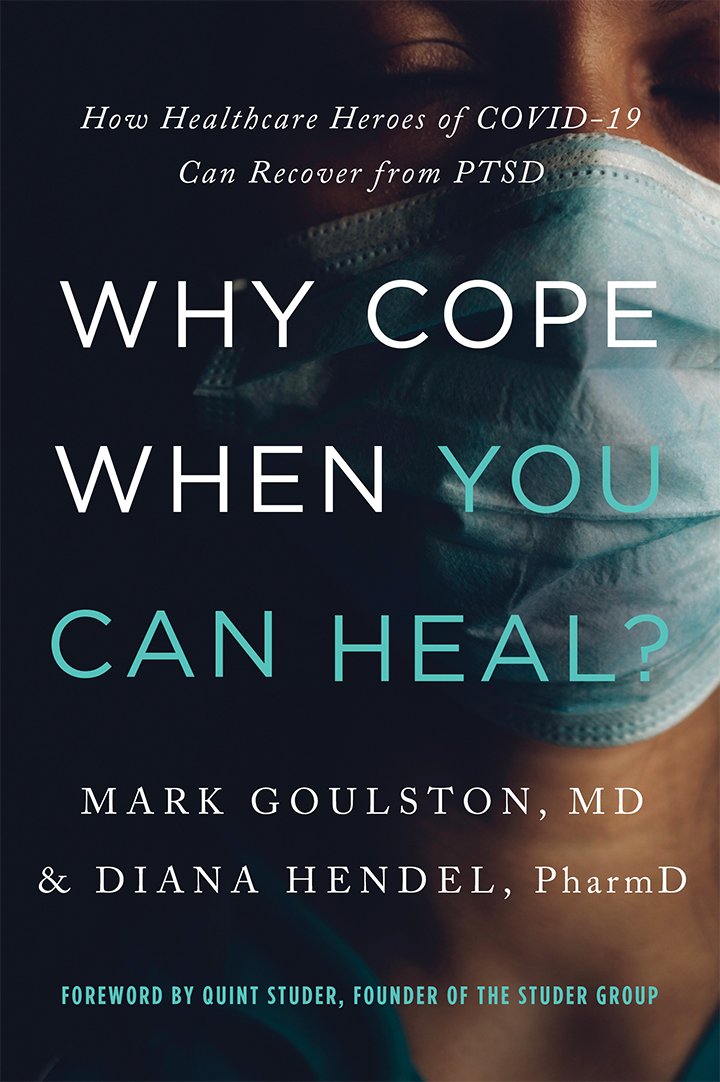COVID-19 could lead to an epidemic of post-traumatic stress disorder in healthcare workers. Mark Goulston, MD shares a new approach to helping them heal: Surgical Empathy.
There’s growing evidence that healthcare workers are developing post-traumatic stress disorder due to COVID-19. That may be no surprise, given how difficult this past year has been for frontline employees. But Mark Goulston, MD says PTSD is not inevitable. His approach to treating traumatic stress—called Surgical Empathy—helps healthcare providers heal from the inside out.
“Surgical empathy is helpful when a person’s mind is overwhelmed from external stimulus and their internal pain—pain that has been suppressed, unprocessed, and/or undealt with,” says Dr. Goulston, coauthor along with Diana Hendel, PharmD, of Why Cope When You Can Heal?: How Healthcare Heroes of COVID-19 Can Recover from PTSD.
“This process uses empathy with surgical precision to meet people where they are and help them ‘feel felt’ and less alone in their feelings.”
When people are finally able to tap into their pain, they can stop coping with it and finally begin to heal, says Dr. Goulston. He compares the healing process to draining an angry abscess that was sutured too quickly and finally allowing the wound to heal.
The following Surgical Empathy exercise is great not only for healthcare workers but for anyone impacted by COVID-19 or any other traumatic experience. It is based on Dr. Goulston’s 12 Phase Emotional Algorithm, which describes the road to, through, and back from trauma.
This exercise can be done alone or as part of a group. You can do it repeatedly and each time you will discover new insights that help you move further along your healing journey:
Trauma
Think back to the traumatizing event or events that created a fight, flight, or freeze response in your mind and body when it occurred. As you recall the event(s), make sure that you keep breathing. If you notice your heartbeat or breathing increasing, pause and focus on your breath before continuing to remember the trauma. Remind yourself that you survived and be compassionate toward your former self who was so upset at the time.
Horror
Remember what it was like to feel the utter horror of the event(s). Allow yourself to experience any feelings of horror that you were unable to feel at the time because you had to keep going. Remember to pause if you feel yourself becoming triggered by memories of this horror.
If this happens take a few moments to look around and take in your environment. Look for five things you can see (for example a window, a table, a pen). Think about what you feel (your shirt, your legs, the armrest of your chair), smell (the scent of rain), hear (traffic outside), and taste (the flavor of toothpaste). This will ground you in the present moment.
Terror
Allow yourself to feel the terror you felt as your survival mechanisms (fight/flight/freeze) kicked in. Remember that we are meant to feel fear when we perceive danger. It is totally natural. Feel empathy for your earlier self who felt so afraid (and still feels afraid). With complete compassion and understanding, tell your former self (and your present self) that it is okay to feel afraid and that you are not alone.
Fragile
Lean into the fragility you felt and continue to feel following your trauma. Feel unconditional love, acceptance, and understanding for your earlier self who struggled to hold it together. Remind yourself that you are safe and secure right now and that what was once shattered can be repaired.
Overriding Panic: Remember how it felt to override a panic response when you saw so many others in need and hurting, while you felt helpless and powerless. Remember being totally overwhelmed with feelings and emotions. Be gentle with yourself and try not to judge the way you reacted or wanted to react.
Suppressed Thoughts
Remember the sheer exhaustion of trying to push aside everything you thought or were thinking.
Feel empathy for your former self who had to bypass thoughts of guilt, shame, blame, and self-loathing to survive. Realize that these thoughts are normal to have and that they don’t make you a weak or shameful person. The thought really isn’t the deed.
Repressed Feelings
To survive a trauma you pushed your feelings down so they would not bubble up into your conscious mind. Now other behaviors may have erupted due to this avoidance. What feelings are your coping behaviors (such as drinking, overeating, irritability) covering up? Spend time with every feeling that comes to mind. Acknowledge them fully and allow them to be felt.
Focus and Function
Remember how it felt to put your own needs aside and rise to the occasion.
You may recall the adrenaline rush you felt that helped you keep on going day after day, even as you knew something wasn’t quite right deep inside. Focus on what it was like to put that assault on your inner well-being on the back burner. What did you neglect so you could help patients? What would you like to do for yourself now that you have time to stop and reflect?
Danger Has Passed
The horror and terror you experienced taunt you, and your new normal is a feeling in your body telling you that you must always be alert—especially when you revisit the place where the trauma occurred (most likely your workplace). How does this impact you today? What about your workplace triggers or unsettles you? Work to accept that while your work environment may not be as safe as you previously thought, this does not have to paralyze you or prevent you from living a full life.
PTSD
Immerse yourself in the pain of living with your trauma. Which routines and protective behaviors allow you to function in the world? How do they protect you? What would you do if you were not impacted by post-traumatic stress?
Disabled or Recovered
Can you label the emotions that come up again and again and make you feel stuck? These are the ones that must be fully felt before you can fully recover. With complete compassion, commit yourself to give your feelings the space to exist. Allow them to be felt and shared and notice how their power begins to fade.
Healed
Finally, experiencing the emotions you pushed away to survive will drain the abscess and enable you to heal. Keep telling yourself that healing is possible and that you can once again feel peace and joy.
It can be frightening to face and process your feelings around what you have experienced during the pandemic, but the payoff is huge. Surgical Empathy can help you reclaim a sense of safety and control over your life and help you to show up fully to do your important work.
“Don’t forget that post-traumatic stress leads to post-traumatic growth,” concludes Dr. Goulston.
“Overcoming trauma can bring a new sense of meaning to past events and can deepen your camaraderie and resilience. You may not be there yet, but you can look forward to the day when you feel newly empowered to take life by the horns and truly make it count.”











